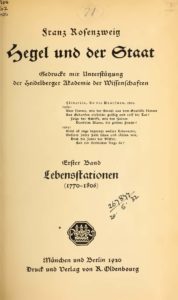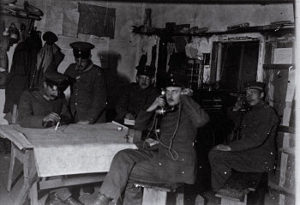The Annotated Star employs various digital technologies — often referred to as the digital humanities (DH) — to aid in the preservation of Franz Rosenzweig’s philosophical and theological legacy. It thus hopes to promote new modes of inquiry into the questions about belief and reason, language and translation, intellectual history and biography raised by Rosenzweig’s life and work. As a multi-faceted, ongoing project, the Annotated Star consists of the following research goals:

The title page of Rosenzweig’s first book. [Photo: University of Toronto Library]
- To build a digital annotation platform for The Star of Redemption. This platform will enable users to annotate passages where Rosenzweig’s text refers, alludes to, or directly cites other texts. The Star of Redemption provides a challenging test scenario for crowd-sourced, interactive scholarship as it draws on a range of disciplines: from philosophy to theology, cultural studies and music, science and literature. The goal is to create an online interface that allows users to share intertextual references, create hyperlinks to navigate between these references, and display such references (and users’ commentary) parallel to Rosenzweig’s original text.
- To increase accessibility to Rosenzweig’s archival holdings through digitization. The geography of Rosenzweig’s literary estate reflects the German-Jewish diaspora of the twentieth century. His manuscripts, letters, and library are housed in the United States, Germany, Israel, and Tunisia. In order to overcome national (and institutional) barriers, we hope to create a centralized online collection of Rosenzweig’s archive.
- To explore Rosenzweig’s work using digital tools. This aspect involves using various digital tools – such as network visualization, topic modeling, and machine translation – to analyze Rosenzweig’s work.
The significance of combining Rosenzweig’s philosophy with the digital humanities lies in the case he makes for humanistic modes of thought in times of rapid technological development. As Viktor Mayer-Schönberg and Kenneth Cukier contend, the accuracy of information matters little in the world of Big Data, where the ability to recognize large-scale patterns offsets the faults of messy data. In contrast, Rosenzweig’s philosophy reveals the refusal of critique to give up on even the most infinitesimal elements of life and experience. For Rosenzweig, knowledge was a question neither of scientific proof, nor the scale of Big Data, but rather of the accumulation of tradition and the contributions, however minuscule, made by individuals in the service of an unreachable Absolute. Rosenzweig sought to put this theory of knowledge into practice through his work in the Jewish renewal movement and at the Freies Jüdisches Lehrhaus. The different aspects that make up our the Annotated Star project follow this lead, taking the open-access tools and iterative processes of the digital humanities as a means of preserving and promoting the legacy of Rosenzweig’s thought in the twenty-first century.
FRANZ ROSENZWEIG (1886-1929)
Franz Rosenzweig was one of the leading German-Jewish thinkers of the early twentieth century, whose work spans subjects such as history of philosophy, the philosophy of history, translation and Jewish literature, and Christian-Jewish interfaith dialogue. Beyond his collaborative efforts to translate the Hebrew Bible into German with Martin Buber, Rosenzweig is perhaps best known for his theological-philosophical magnum opus, The Star of Redemption (Stern der Erlösung). Being a final landmark of the tradition of German-Jewish thought, the The Star of Redemption is remarkable for its nuanced web of philosophical, religious, and literary allusions to both German and Jewish, ancient and modern sources.

Rosenzweig during the First World War
Rosenzweig was born in 1886 to the assimilated, bourgeois household of Georg and Adele Rosenzweig in Kassel. Attending the universities of Freiburg, Munich in Berlin, Rosenzweig completed his doctoral studies in history and philosophy in 1912 under the historian Friedrich Meinecke. But Rosenzweig’s dissertation and first book, Hegel and the State (Hegel und der Staat) was only published after the First World War, in which Rosenzweig served in Macedonia and the end of which Rosenzweig (as well as many of his generation) experience as a radical break with the Kaiserreich in which he had been raised. Deciding against the career of a historian, Rosenzweig instead dedicated his work to the revitalizing of Jewish life in Germany and co-founded in 1920 the Freies Jüdisches Lehrhaus in Frankfurt am Main, which he would lead until he fell ill in late 1921. Bedridden with ASL (amyotrophic lateral sclerosis), Rosenzweig nonetheless continued to read, write, and correspond copiously for eight years, until his death in 1929.
You can read more about Rosenzweig’s philosophy at Benjamin Pollock’s entry on Rosenzweig at the Stanford Encyclopedia of Philosophy.